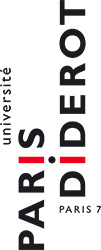Outils pour utilisateurs
DiffÃĐrences
Ci-dessous, les diffÃĐrences entre deux rÃĐvisions de la page.
| Les deux rÃĐvisions prÃĐcÃĐdentes RÃĐvision prÃĐcÃĐdente Prochaine rÃĐvision | RÃĐvision prÃĐcÃĐdente | ||
|
fr:programme [2015/05/13 08:26] nkubler [Marie-Françoise Narcy-Combes] |
fr:programme [2021/11/30 02:09] (Version actuelle) |
||
|---|---|---|---|
| Ligne 2: | Ligne 2: | ||
| - | Vous pouvez tÃĐlÃĐcharger le programme ici {{:fr:trela_programme.compressed.pdf|}}Â | + | Vous pouvez tÃĐlÃĐcharger le programme ici {{:fr:prgramme_trela_30juin.pdf|}}Â |
| - | ===== ConfÃĐrenciers invitÃĐs ===== | + | Â |
| + | ===== ConfÃĐrences plÃĐniÃĻres ===== | ||
| Ligne 11: | Ligne 12: | ||
| at the University of California at Berkeley** | at the University of California at Berkeley** | ||
| - | Presentation | ||
| - | APPLIED LINGUISTICS: A THEORY OF THE PRACTICE | + | **APPLIED LINGUISTICS: A THEORY OF THE PRACTICE** |
| Ligne 53: | Ligne 53: | ||
| ======Guy ASTON====== | ======Guy ASTON====== | ||
| - | **Alma mater Professor of English linguistics, University of Bologna** | + | **Alma Mater Professor of English Linguistics, University of Bologna**Â |
| + | Â | ||
| + | **CORPORA ARE USEFUL TOOLS FOR TRANSLATORS: AND FOR INTERPRETERS?**Â | ||
| + | Â | ||
| + | The differences between translation and interpreting (be the latter simultaneous, consecutive, or dialogue) would appear to exclude from an interpreting context many of the uses of corpora proposed for translation (Kubler & Aston 2010). Interpreters need to understand and produce appropriate speech, not writing. They have limited time in which to translate, and hence little chance to consult reference materials when faced with problems. And they have virtually no possibility to revise their output. In such conditions, what use can corpora possibly be? | ||
| + | Â | ||
| + | In the absence of significant developments in speech recognition and machine translation, the main value of corpora for interpreters would seem to lie in the areas of preparation and training. Corpora can help interpreters, like translators, to become familiar with genres, topics, and terminology they are likely to have to face. This is particularly the case where a corpus contains transcripts which are aligned with audio/video, enabling the user to hear as well as view occurrences, and hence verify and compare their prosodic as well as their lexicogrammatical characteristics (Aston 2015). But there are arguably other potential uses of corpora for the trainee interpreter. If we consider Gile's metaphor of the interpreter as a tightrope walker, trying to maintain a balance between the various efforts of comprehension, memorisation, production, and coordination (Gile 1999), it seems legitimate to ask how such efforts may be effectively reduced. A wide variety of work on other kinds of stressful speech management suggests that a key role may be played by the use of formulae, which can enhance reliance on memory rather than processing (Bolinger 1976). Developing a more extensive formulaic repertoire may facilitate comprehension on the one hand, and production on the other; the analysis by trainees of formulaic uses (n-grams, concgrams) and their prosodies in corpora of interpreting input and output may thus facilitate the acquisition of the phraseological competence necessary to achieve more fluent interpreting performance. | ||
| + | Â | ||
| + | Aston, G. 2015. Learning phraseology from speech corpora. In A. Lenko-Szymanska and A. Boulton (eds), Multiple affordances of language corpora for data-driven learning. Amsterdam: John Benjamins. 65-84. | ||
| + | Â | ||
| + | Bolinger, D. 1976. Meaning and memory. Forum Linguisticum 1: 1â14. | ||
| + | Â | ||
| + | Gile, D. 1999. Testing the Effort Models' tightrope hypothesis in simultaneous interpreting - a contribution. Hermes 23: 153-172. | ||
| + | Â | ||
| + | Kubler, N. & G. Aston 2010. Using corpora in translation. In A. O'Keefe & M. McCarthy (eds), The Routledge handbook of corpus linguistics. London: Routledge. 501-515. | ||
| - | Corpora are Useful Tools for translators: And for Interpreters? | ||
| Ligne 62: | Ligne 75: | ||
| **Professeur ÃĐmÃĐrite en didactique des langues, UniversitÃĐ de Nantes** | **Professeur ÃĐmÃĐrite en didactique des langues, UniversitÃĐ de Nantes** | ||
| - | Terrains de recherche et rÃĐsistances sociopolitiques : rÃĐalitÃĐs et problÃĻmes | + | **TERRAINS DE RECHERCHE ET RESISTANCES SOCIOPOLITIQUES / REALITS ET PROBLEMES$** |
| Au delà du savoir et des thÃĐories en linguistique appliquÃĐe l'intervention sur le terrain se heurte le plus souvent à des rÃĐsistances d'ordre politique, ÃĐconomique et socioculturel, qui exigent de la part du chercheur une vigilance de tous les instants pour proposer des dispositifs et des adaptations qui en tiennent compte sans renoncer à la rigueur scientifique et à la dÃĐontologie professionnelle; | Au delà du savoir et des thÃĐories en linguistique appliquÃĐe l'intervention sur le terrain se heurte le plus souvent à des rÃĐsistances d'ordre politique, ÃĐconomique et socioculturel, qui exigent de la part du chercheur une vigilance de tous les instants pour proposer des dispositifs et des adaptations qui en tiennent compte sans renoncer à la rigueur scientifique et à la dÃĐontologie professionnelle; | ||

